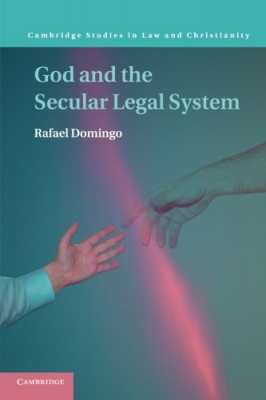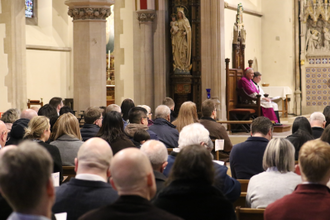Book: God and the Secular Legal System

God and the Secular Legal System, Rafael Domingo, Cambridge University Press
It is sometimes claimed that secular legal systems such as state law, do not have a theology behind them. This book, however, offers an approach to these systems that includes a theistic idea against simplistic and agnostic and atheistic conceptions.
The author is a Spanish Catholic jurist for whom a respect for God requires a secular state which acknowledges that there is an antecedent source of law and rights above the positive laws of the state, that is, as a metalegal concept.
Multi-culturalism and inter-faith realities have led to the modern state which, it seems, must be secular. One point of view is that the state is over and above all of the religions and so it becomes the repository of its own secular faith which supersedes religion.
The other view is that the state sits alongside the religions and has no business trying to control them. He argues that for the state to reduce God and religion to a political category or a legal command is a form of political idolatry or even blasphemy.
He is very clear that the modern state must not establish a secularist ideology, whether liberalism, socialism, communism, or fascism, that stands in the place of a traditional religion and commands comparable devotion and allegiance in violation of the conscience of the individual, the authority of religious community, and the sovereignty of God.
New secularist approaches are countered which view religion as just another category of liberty with no more preference or privilege than others and religion if subject to the rules of rational democratic deliberation the same as everything and everyone else.
The author counters this by arguing for "a secular theistic approach" which separates religion and the state, which accommodates all sincere claims of conscience, and which defers to the inner working of religious communities.
This argument depends on a complex differentiation of different spheres of life and power. It presupposes the ability of secular reason and secular law to operate with religions as an ally, not as an object or enemy. It presupposes the ability of religions to cooperate with the state whilst being confined to its particular sphere of interest. It also presupposes distinctions between religion and law, religion and morality, conscience and belief, secularity and secularism, the spiritual and temporal orders, and more.
His scholarship is wide-ranging and considers politics, history, jurisprudence, political theory and so on with reference to Dworkin, Rawls, Habermas, Taylor and Popes John Paul II and Benedict XVI. The author's goal is to reset the relationship between God, religion, conscience and law which secular legal systems should treat with respect, that is, specific actions that express and reflect that appreciation.
Secularisation, which first emerged in Western Christian culture, is the process of differentiating secular from religious institutions. This theological idea has no equivalent in other religious traditions or Eastern Christianity. The purpose of a secular legal system is to enable citizens to live and develop together within a single framework, despite disagreement over fundamentals. The assumption of a common human reason provides the epistemic justification for a legal system that does not depend on religious legitimation.
The author contends that the recognition of God actually strengthens secular legal systems from the outside without demanding any sacrifice of liberal democratic principles because God and religion are ontologically distinct. The metalegal God enhances conceptions of other metalegal ideas, such as dignity, solidarity, equality, and human rights, which are at the heart of all democratic systems. God's presence illuminates law and permits a deeper understanding of basic legal principles and ideas.
It is very interesting to recall that the idea of freedom of religion, as exists in the US Constitution, emerged from legal Protestant theory with its reliance on sola scriptura, that is, Scripture alone (without tradition) and, hence, the reliance on legal language alone for conclusions about constitutionality and the intention of the Founding Fathers of that country.
However, Catholics understand Scripture in another way since they are read in line with the Tradition of the Church and are subject to the judgment of the authority of the Magisterium. Hence, Catholic theology is more open to interpreting the US Constitution according to traditions and not just legal ideas.
So we can say that there are substantial historical connections between theology and jurisprudence as human sciences which also include the now rapidly expanding field of law and religion. The principles of all secular legal systems can utilise this connection and not treat religions as irrelevant, private or competitors.
Any secular legal system should approach God, religion, and conscience separately because each affects the legal system in a different manner. Nationality, supranationality, private and pubic morality, religious exception and the privilege of abstaining, and recognition, toleration and accommodation.
These ideas provide a legal system with the keys to establishing a new, coherent constitutional framework for the protection of rights to religion and freedom of conscience in an age of diversity, interdependence and secularisation. A thoroughly interesting and timely book which challenges the current assumptions of the importance of religions in secular societies.
James Campbell SJ, BSc, MA(Oxon), LLM, Phd is currently the Chief Librarian and Senior Lecturer in Canon Law at Hekima University College, Nairobi. Before training for the priesthood he worked as a consultant in environmental pollution for several government agencies and has an honours science degree from Strathclyde University. Since his ordination has been Chaplain to Stonyhurst College, parish priest of Farm St., London, Tutor in Canon Law at Campion Hall, Oxford as well as several other posts. He read Philosophy, Politics and Economics at Oxford and holds an LL.M. from Cardiff Law School and a joint PhD/JCD Doctorate in Canon Law from the University of Louvain).















